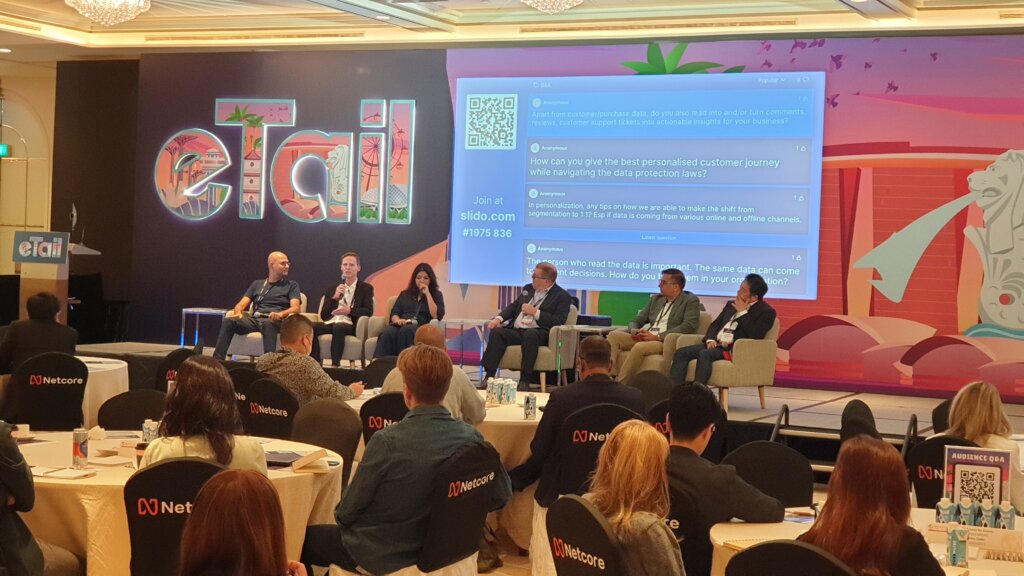
eTail Asia 2023 brought together thought leaders from retail and e-commerce industry.
What went down at eTail Asia 2023
|
Getting your Trinity Audio player ready... |
There is no doubt that the growth of Southeast Asia’s e-commerce market has accelerated since the mid-2010s, but at this year’s e-Tail Asia, it’s clear that the COVID-19 pandemic has propelled the industry into a new phase. Dubbed Asia’s premier e-commerce and digital marketing retail summit, the three-day conference centered around how the region’s e-commerce market is constantly shifting.
eTail Asia 2023 welcomed over 350 retailers who participated in sessions with meaningful topics such as the importance of brick-and-mortar stores in a digital world and upcoming trends in e-commerce that should never be neglected. Speakers and attendees included leading industry analysts and C-level executives from some of the biggest brands in the world, discussing top technology trends transforming the retail space.
The summit started with a half-day end user-only Focus Day workshop that allowed attendees to evaluate the latest and most significant technology initiatives coming to market with peers. The opening keynote interview on Focus Day, moderated by Tech Wire Asia, touched on a user-centered approach to tech implementations.
In the session, Suhaib Anwar, Head of Growth & Martech, MyDeal.com.au mentioned some of the challenges faced in the industry when it comes to implementing new technology. For Anware, avoiding a technology mismatch is a key area that businesses should be aware of when investing in tech. Echoing his views was Harshavardhan Chauhaan, Chief Marketing & Omnichannel Officer – Spencer’s Retail, Nature’s Basket & D2C Brands, Spencer’s Retail. Chauhaan believes that while technology is essential, businesses need to have a open approach towards it, especially if they are looking to understand their consumers better.
The Focus Day also saw attendees take part in various roundtable discussions with tech vendors to understand how they can improve their business needs. Among the brands participating in the roundtable discussion include ChannelEngine, Mastercard, Edgio, Partnerize, Netcore Cloud, Content Square and Monday.com.
On the first day of the eTail Asia conference, panel sessions discussed the imperatives reshaping retail, and how businesses can best navigate new opportunities as the industry enters a meta economy. At eTail Asia 2022, there were huge discussions around the ‘Buy Now Pay Later‘ trend, eTail Asia’s 2023 summit was primarily dominated by topics like omnichannel retail and generative AI.
Conversations centered on how the increasing blend of online and in-store shopping experiences is becoming the norm for the retail industry. Based on the statistics shared, the retail landscape is expected to remain highly diverse and fragmented until 2030, with small-format retail, such as traditional trade and convenience stores, capturing 40% to 50% of sales, according to a report by Bain & Company and the World Economic Forum (WEF).

One of the panel discussions at eTail Asia (Source – Tech Wire Asia)
Retail and e-commerce post pandemic
The opening keynote panel discussion on how businesses can best navigate new opportunities in a shifting retail economy saw panelists from various businesses share how they have adapted to the new normal in retail and commerce. One of the panelists, David Brunnier, CEO and Founder of Flash Coffee, shared how the company had to adapt technology as they look to provide high quality coffee to five markets in Asia. Another panelist, Stefano Fazzini, Co-founder & CEO, MetroMart, the first online grocery delivery platform service in the Philippines shared how they have grown to become one of the leading platforms in the country.
Interestingly, Chauhaan, who was also part of the panel, highlighted that the onus is on businesses post COVID-19 to make the retail experience frictionless and convenient. Consumers have adapted to new ways of shopping. Retail stores are still relevant but it’s how they can leverage technology that will make the difference.
“Be it leveraging technology, leveraging platforms, newer SAS capabilities, or taking it to a different level, the future of retail is that there is no other future of retail apart from being truly ‘phygital’. You won’t find that word in the Oxford dictionary for sure, but phygital essentially, is a portmanteau of physical and digital, which again, is a consumer centric way of saying that everybody here is either listening to us or on their phones, there is no third way. So, businesses have to be at the cusp of physical and digital, which means that pure play commerce players have to look and solve for the touch and feel and experience for consumers. There is no compromise there,” explained Chauhaan.
During a session that discussed the future of omnichannel retailing in Southeast Asia, Thomas Yeoh, Asia Managing Director at Baozun Inc, shared how retailers that excel in finding their optimal omnichannel offering will lead the pack as consumers demand choice and flexibility. “Although online penetration is very high, offline is still very important. After the pandemic, people have flocked to retail stores, and It is especially apparent among GenZs,” Yeoh said.
On generative AI, experts spoke to the dramatic speed of ChatGPT implementation and its impact on marketing. Industry leaders also discussed how e-commerce brands could leverage generative AI to improve efficiency, automate processes, and provide more personalized customer support.
“Artificial Intelligence is going to be the next big thing in marketing. The idea is to tell you what you need, even before you know what you need,” Hoong An Wong, Commercial Director at VIPSHOP, shared at eTail.

Tech Wire Asia’s Dashveenjit Kaur moderates a panel discussion. (Source – Tech Wire Asia)
Discussions and networking dominate eTail Asia 2023
Panel sessions on the final day of the summit focused on trends and predictions shaping the retail industry for the rest of this year. Tech Wire Asia also had the chance to moderate one of the final sessions before the curtains were drawn for this year’s summit.
Panelists from Poly, the video and audio conferencing technology arm of HP Inc, Chemcorp as well as Blackmores shared how their respective organizations monitor competitors across every digital channel and anticipate shifts in the market to stay on top of best practices.
“Brands need to monitor competitor content visibility and product offerings across every digital channel. Be it through client reviews online or even through brands’ advertisements across the internet. As a result, you can strengthen your brand’s market position and deliver products and services to address your audience’s pain points,” Poly’s head of consumer & eTail marketing in APAC, Smriti Modi told the crowd.
As for Frame Paladsang, the digital marketing and e-commerce specialist of Chemcorp Pty Ltd, ways to monitor competitors in the beauty industry continue to evolve with time. “We have to observe what our competitors are doing online not only in terms of price but also in terms of their loyalty programs and even how their influencer marketing works,” she shared.
“Influencer marketing is a dynamic space that is constantly changing. Brands are looking for new ways to engage with their audience and shifting ad spends towards this channel. We will have to ensure that the needs of customers according to their geographical locations are swayed by the content they consume on social media. All these conditions lead to the evolution of the influencer marketing landscape,” Paladsang concluded.
READ MORE
- Safer Automation: How Sophic and Firmus Succeeded in Malaysia with MDEC’s Support
- Privilege granted, not gained: Intelligent authorization for enhanced infrastructure productivity
- Low-Code produces the Proof-of-Possibilities
- New Wearables Enable Staff to Work Faster and Safer
- Experts weigh in on Oracle’s departure from adland


